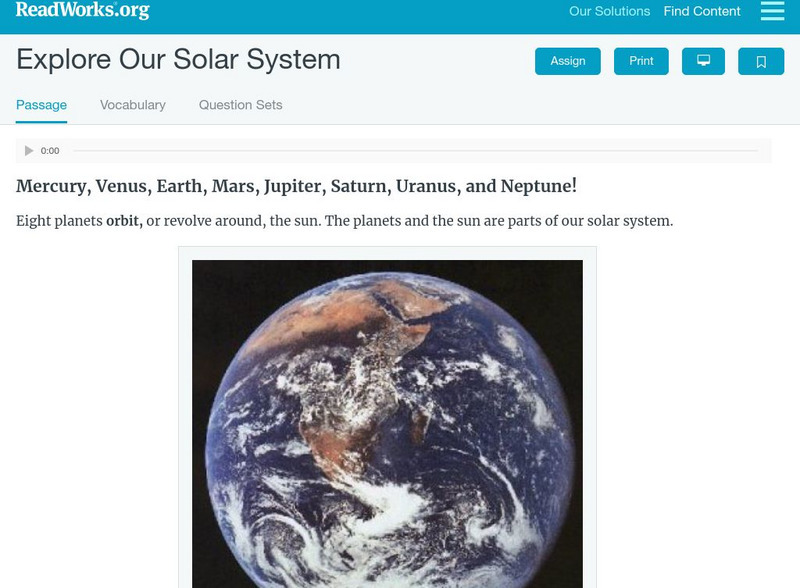A to Z Teacher Stuff
Solar System Book
Young astronomers travel through the solar system in the pages of this printable book. With clear pictures and simple sentence structure, this is a perfect resource for exploring the planets in the early elementary grade levels.
Super Teacher Worksheets
Our Solar System Scavenger Hunt Activity
Send students on a search for facts about the solar system with this scavenger hunt activity. Whether they are finding out how far the sun is from the earth, or the names of all four gas giants, this resource will engage young...
Voyage Solar System
Round and Round We Go — Exploring Orbits in the Solar System
Math and science come together in this cross-curricular astronomy lesson plan on planetary motion. Starting off with a hands-on activity that engages the class in exploring the geometry of circles and ellipses, this lesson...
University of California
Seasons Lab Book
Unlock the mystery behind seasonal change with a collection of worksheets and activities. Whether they are drawing pictures of Earth's orbit around the sun or graphing the temperature and daylight hours of different locations...
Lake Afton Public Observatory
Shadows, Angles, and the Seasons
Shine some light on the topic of seasonal change with this collection of activities. Whether it's by measuring the change in the length of their shadows, or modeling the earth's orbit around the sun using a lamp and a globe, these...
Laboratory for Atmospheric and Space Physics
Where Are We Going?
Come take a ride on the space bus! Scholars go on an imaginary trip to pick up their peers from the inner and outer planets while reinforcing math skills. First, learners round decimals to identify each planets' distance from Earth....
Laboratory for Atmospheric and Space Physics
The Planets and Scale
Scholars gain an insight into the relative size of planets and distance between inner and outer planets with the help of informational text, a data table, and a series of four questions.
Laboratory for Atmospheric and Space Physics
Space Travel Guide
Looking to take a trip? Why not go to space? Here, scholars take on the role as travel agent to create a guide to their favorite planet including travel tips and sightseeing recommendations.
Laboratory for Atmospheric and Space Physics
Charting the Progress of New Horizons
In 2006, New Horizons began its mission to fly to Pluto. As it continues its journey, scholars track its progress with the help of an informative website, all the while reinforcing measurement concepts with the construction of a scaled...
Laboratory for Atmospheric and Space Physics
Looking to the Future
New Horizons set forth on a mission to Pluto in 2006. Ten years later, the spacecraft is still on its way. Here, enthusiastic scholars predict what they will be like—likes, dislikes, hobbies, etc.—when New Horizons arrives at its...
Laboratory for Atmospheric and Space Physics
Growing Up With A Mission
New Horizons began its journey to Pluto in 2006. Ten years later, it continues its mission. In that time, scholars have surely grown, but how much more will they grow by the time New Horizons reaches its destination? Find out with an...
Kentucky Educational Television
The Road to Proportional Reasoning
Just how big would it really be? Young mathematicians determine if different toys are proportional and if their scale is accurate. They solve problems relating scale along with volume and surface area using manipulatives. The...
Nemours KidsHealth
Vision
From the iris and retina to glasses and contact lenses, learners will be excited to see what activities are in store for them as they learn about the complex organ of the human eye.
Teach Engineering
Energy Sources Research
Turn your pupils into teachers! Here is a lesson that requires groups to research an energy source with the provided handout, create a poster, and present their information to the class. Connections are made to practical aspects of...
Read Works
Read Works: Explore Our Solar System
[Free Registration/Login Required] This informational text passage shares facts about planets in the solar system. This passage is a stand-alone curricular piece that reinforces essential reading skills and strategies and establishes...
NASA
Nasa: 21th Century Explorer: Why Do We Want to Study and Travel to Mars?
This article answers some of the most common questions about Mars: Why is it red? Is there water on Mars? What else have scientists discovered from spacecraft that have landed there? Also, visitors can follow links to learn more about...

















